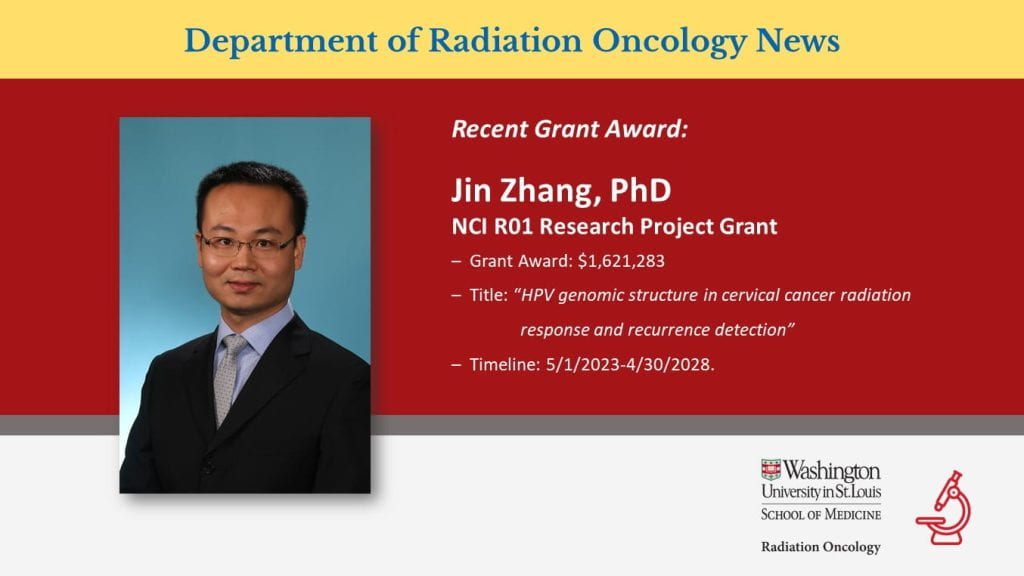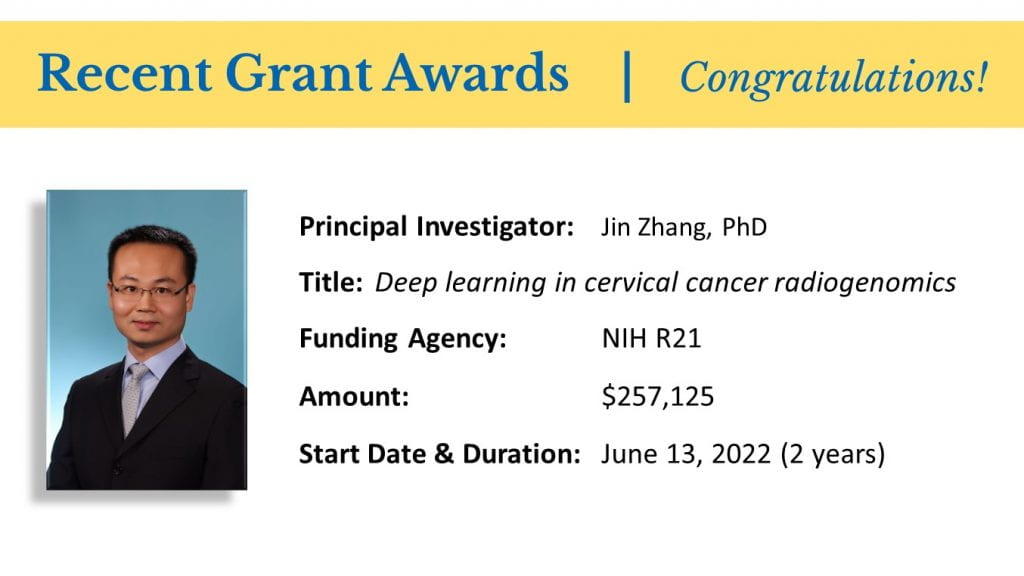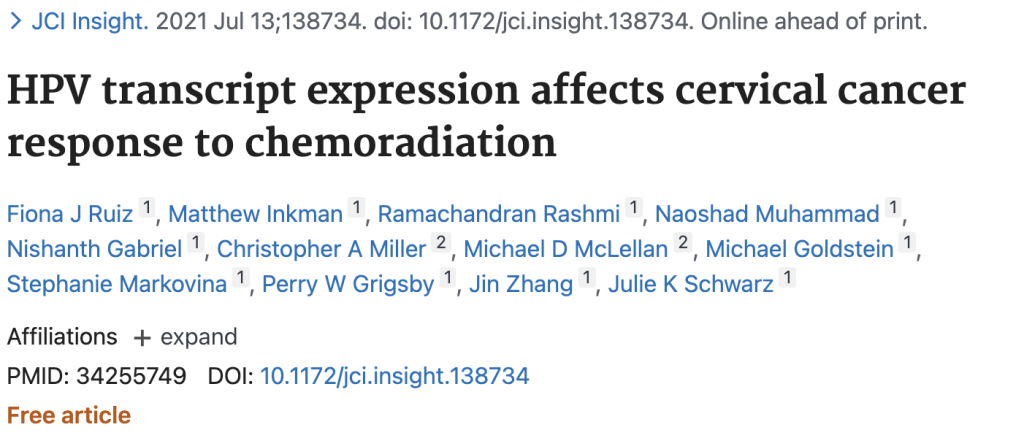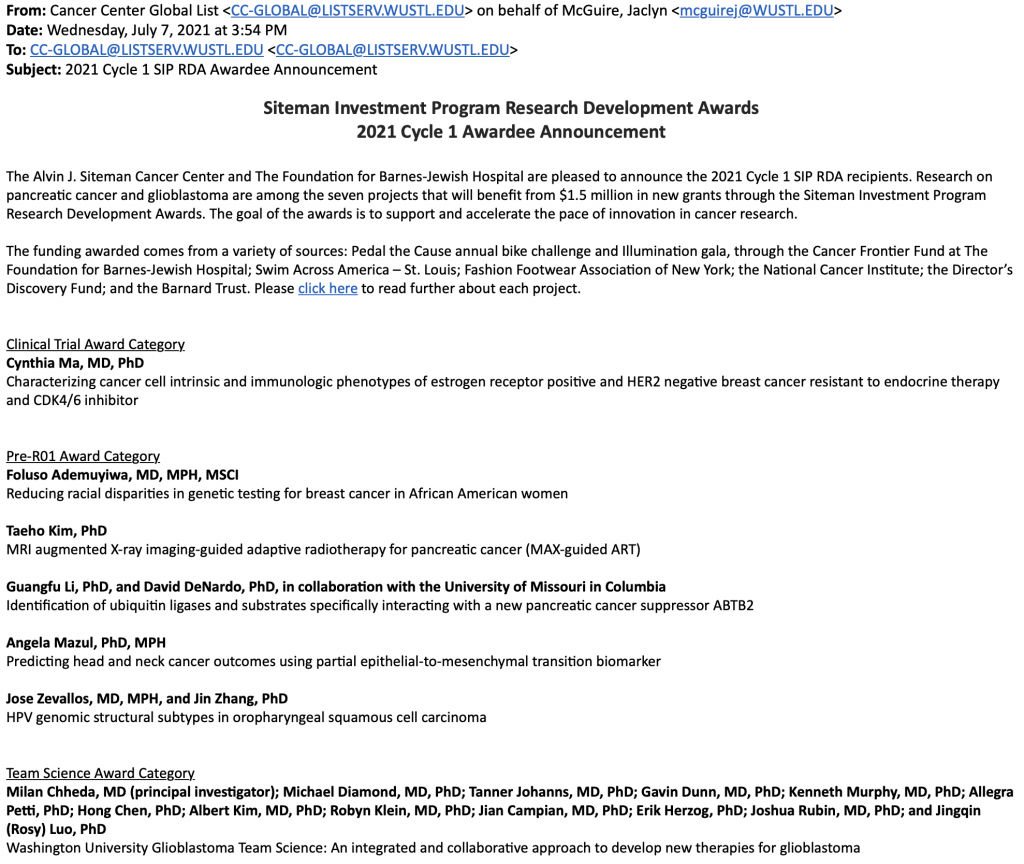NIH grant to fund radiation oncology center on Medical Campus
Proud to be a Co-I of our METEOR-BioLogical Specimen Translation (METEOR-BLST)
By Julia Evangelou Strait • February 4, 2024
https://medicine.wustl.edu/news/nih-grant-to-fund-radiation-oncology-center-on-medical-campus/

Kay accepted into the Cancer Biology Pathway Training Program
By Jin Zhang • September 26, 2023

Kay has been accepted into the Siteman Cancer Center, Cancer Biology Pathway Training Program. This Pathway will provide training in the biology of cancer and an opportunity for future cancer research. Two years of full funding of stipend at the Washington University level has been provided. Congratulations Kay!
Zhang awarded second R01 this year
By michellel • September 7, 2023

Jin Zhang, PhD, has been awarded an NCI R01 Research Project Grant in the amount of $1,663,760 over a period of 5 years. The title of his work is “Integrating multi-omics, imaging, and longitudinal data to predict radiation response in cervical cancer”. This is the second R01 grant Dr. Zhang has been awarded during 2023.
Kay received a full scholarship to attend University of Washington’s Biostat Camp
By Jin Zhang • June 15, 2023

Congratulations Kay!
Zhang awarded 1.6 million NCI R01 grant
By michellel • May 1, 2023

Jin Zhang, PhD, has been awarded an NCI R01 Research Project Grant in the amount of $1,621,283 over a period of 5 years. The title of his work is “HPV genomic structure in cervical cancer radiation response and recurrence detection”.
Zhang receives NCI R21 grant
July 1, 2022

Jon and Emily join the Lab
Nov 8, 2021

Jonathan Decavel-Bueff and Emily Benedict have joined the Zhang Lab.
Jonathan is a master’s student in the computer science department.
Emily is a DBBS graduate student in the Computational and Systems Biology Program.
Welcome to the Zhang Lab!
JCI Insights paper published
July 16, 2021

Zevallos and Zhang receives SIP grant
July 7, 2021
Proud to be working with Dr. Jose P. Zevallos’ group on HPV genomic structures in oropharyngeal cancer.

Alex and David join the Lab
June 14, 2021

Alex Eaton and David DeBruin have joined the Zhang Lab.
Alex Eaton is a master’s student in the computer science department.
David DeBruin is a bioinformatics research assistant with an interest in machine learning.
Welcome to the Zhang Lab!
Kay joins the DBBS program
By Jin Zhang • April 6, 2021

Kay Jayachandran will join the Division of Biology and Biomedical Sciences as a Ph.D. student in Biomedical Informatics and Data Science (BIDS) in Fall 2021. She graduated from the University of Washington, Seattle with a B.Sc. in Physics with a minor in Mathematics. She has been with the Zhang Lab for 2 years as a Research Technician II and contributed to many projects and papers (SR, MCT, JCI, CCR). Great work and congratulations, Kay!
Zhang’s work highlighted in QuadShot News
By michellel • March 15, 2021

From QuadShot News:
A hot mes | Zhang, J Clin Invest 2021
We know increased PET-avidity is often a harbinger for more aggressive disease. But what can we do about it? This intriguing translational work from Wash U retrospectively analyzed cervical tumors to search for PET harbingers of tumor genomics. A training cohort (n=67) was used to develop three molecular subtypes which predicted overall survival. A validation cohort (n=304) then confirmed the squamous mesenchymal subgroup had worse survival than the squamous epithelial and adenocarcinoma subgroups. Possibly because mesenchymal expression was associated with ex-vivo radiation resistance. What’s more, such epithelial-to-mesenchymal transition (EMT) gene expression was significantly associated with higher SUV and, in line with this, proved sensitive to glycolysis inhibition.
2021-22 Clinical and Translational Research Funding Program awarded to Jin Zhang
March 8, 2021

Paper published at JCI—Integrating imaging and RNA-seq improves outcome prediction in cervical cancer
March 1, 2021
Abstract
Approaches using a single type of data have been applied to classify human tumors. Here we integrate imaging features and transcriptomic data using a prospectively collected tumor bank. We demonstrate that increased maximum standardized uptake value on pretreatment 18F-fluorodeoxyglucose-positron emission tomography correlates with epithelial-to-mesenchymal transition (EMT) gene expression. We derived and validated 3 major molecular groups, namely squamous epithelial, squamous mesenchymal, and adenocarcinoma, using prospectively collected institutional (n = 67) and publicly available (n = 304) data sets. Patients with tumors of the squamous mesenchymal subtype showed inferior survival outcomes compared with the other 2 molecular groups. High mesenchymal gene expression in cervical cancer cells positively correlated with the capacity to form spheroids and with resistance to radiation. CaSki organoids were radiation-resistant but sensitive to the glycolysis inhibitor, 2-DG. These experiments provide a strategy for response prediction by integrating large data sets, and highlight the potential for metabolic therapy to influence EMT phenotypes in cervical cancer.
Zhang J, et al. Journal of Clinical Investigation 2021. PMID: 33645544
Zhang receives K22 award
By michellel • January 13, 2021

Jin Zhang, PhD has received a K22 grant award for $438,661 over 3 years from the NIH.
His research title for funding is “HPV alternative splicing in cervical cancer radiation response”. With the K22 Award, Zhang’s lab plans to develop novel HPV genomic tools and examine the prognostic and mechanistic significance of HPV alternative splicing in cervical cancer radiation response.
Zhang has more than 10 years of research expertise in bioinformatics algorithms, big data analytics (omics), and cancer genomics and is also affiliated with Institute for Informatics (I2) and a member of Alvin J. Siteman Cancer Center.